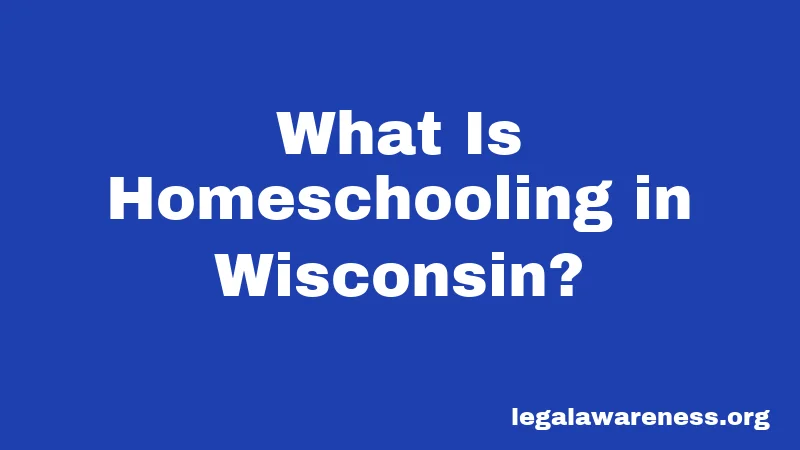Wisconsin Homeschool Laws in 2026: Your Complete Roadmap
Most parents have no idea homeschooling in Wisconsin is actually pretty straightforward. But seriously. Once you understand the basics, you’ll see that Wisconsin has one of the more reasonable homeschool laws out there. Let’s break down exactly what you need to know.
Whether you’re just curious or ready to start, this guide covers everything from filing deadlines to your actual teaching requirements. Stick with me here—we’ll walk through this step by step.
What Is Homeschooling in Wisconsin?

In Wisconsin, homeschooling isn’t considered private school. It’s called a “home-based private educational program.” Okay, that sounds fancy, but here’s what it really means.
You—the parent—become the educator. Your child learns at home under your direction. The program is yours to design, within some basic state requirements. Think of it like this: You’re not running a traditional school at home, but you are running an intentional learning program.
Wisconsin legalized homeschooling back in 1983. Today, thousands of Wisconsin families choose this path. And the state actually supports it reasonably well.
The Key Requirements (The Basics)
Here’s where it gets important. Let me break down what the state actually requires.
You Must File the PI-1206 Form Every Single Year
This is the big one. Every year, you need to submit a form called the PI-1206 Homeschool Enrollment Report. No, you’re not asking permission. You’re simply telling Wisconsin that your child will meet compulsory attendance requirements at home.
The deadline? October 15. Mark that on your calendar.
You file it online through the Wisconsin Department of Public Instruction (DPI) website. It takes maybe fifteen minutes. Your form needs to include basic information—how many kids you’re homeschooling and what grade levels they’re in.
Here’s the tricky part: The form needs to show enrollment as of the third Friday in September. So if you’re starting homeschooling mid-year, you have until October 15 to file. If you’re already homeschooling and filing for the next year, same deadline.
Not sure about the exact dates? Contact the DPI directly at (608) 266-3390 or visit their website.
You Need 875 Hours of Instruction Per Year
Wisconsin requires exactly 875 hours of instruction annually. That’s it. Just 875 hours between July 1 and June 30.
Sound like a lot? Let’s do the math. If you spread 875 hours across 52 weeks, that’s about 17 hours per week, or roughly 3.4 hours per day. Super manageable, right?
But here’s the beauty—you get to decide how you structure it. You could do intensive weeks with shorter daily hours. You could follow a traditional September-to-June schedule. You could even do year-round learning with less daily time commitment. The flexibility is yours.
Just keep records. You don’t have to submit them to the state, but you should track them so you could prove your child got 875 hours if needed.
Your Curriculum Must Cover Six Core Subjects
This is probably the easiest part. Wisconsin requires that your sequentially progressive curriculum includes instruction in these six areas: reading, language arts, mathematics, social studies, science, and health.
Wait, what does “sequentially progressive” mean? It basically means your child builds on what they already know. You’re not jumping around randomly. You move from simpler concepts to more challenging ones as the year progresses.
The good news? You choose exactly how you teach these subjects. You might use traditional textbooks. You might use online curricula. You might use a combination. The state doesn’t care which curriculum you pick, as long as these six subjects are covered.
Also important: If you’re teaching high school, keep records showing your student got instruction in all six subjects during all four high school years. This matters for documentation later.
Your Program Must Be Privately Controlled
Here’s a legal requirement that sounds more complicated than it is. Your homeschool program must be privately controlled. That means you control it—not a government agency or public school.
What this really prevents? Large group settings that look like schools. Wisconsin law is clear: If you’re instructing more than one family unit, it’s not a home-based private educational program anymore. So you can homeschool your own kids, but you can’t run a classroom for multiple families and call it a homeschool.
What About Parents? Do You Need Special Qualifications?

Honestly, this is one of Wisconsin’s best features. The law says nothing about parent qualifications. You don’t need a teaching degree. You don’t need any special background or experience. You don’t need to pass any test.
If you’re the parent or guardian, you can homeschool. That’s the entire qualification requirement. Pretty straightforward, right?
Wondering if this applies to you? If you’re a parent or legal guardian of a child between ages 6 and 18, yes—this is for you.
When Can Your Child Start Homeschooling?
Wisconsin has compulsory attendance starting at age 6. So technically, you can’t enroll a 4 or 5-year-old in a formal homeschool program under Wisconsin law.
But here’s what that actually means: If your child won’t turn 6 before September 1, you don’t need to file the PI-1206 form yet. You can teach them at home, but it’s not a legal homeschool enrollment.
Once they turn 6, or once they reach the age cutoff that same school year, then you file the form. From that point forward, they’re officially homeschooled.
This might sound confusing, honestly. But the takeaway is simple: Kids under 6 are fine without filing. Once they’re 6, you file.
What If You’re Withdrawing From Public School?

This happens a lot. Maybe your child was in traditional school, and now you want to homeschool. Here’s what you do.
You file the PI-1206 form. That’s your official withdrawal notice. The form tells the state your child is now in a home-based educational program, which satisfies the compulsory attendance requirement.
If you’re withdrawing mid-year, file the form within 30 days of starting homeschooling. The school needs to know your child isn’t skipping—they’re switching to legal home instruction.
Pro tip: Some experienced Wisconsin homeschoolers recommend sending a certified letter to your school district with a withdrawal notice. It’s not legally required, but it protects you by creating a paper trail. Better safe than sorry, honestly.
Penalties for Not Following the Rules
Let’s talk about what happens if you don’t comply. This is where it gets serious.
If you don’t file the PI-1206 form, or if you file late, your child’s absence isn’t excused. That sounds minor, but it’s not. Your child could be marked absent from school. Keep that happening, and you could face truancy charges.
Wisconsin truancy law is strict. Here’s the reality: If your child is expected at school but doesn’t show up, the school tracks it. Without a filed PI-1206 form, homeschooling isn’t an excuse.
Penalties for truancy include potential fines and even jail time for parents. We’re talking about substantial consequences. It’s not a slap on the wrist.
This is exactly why filing that form by October 15 is non-negotiable. Seriously. One form. One deadline. That’s your legal protection.
What About Testing and Records?
Good news here. Wisconsin doesn’t require standardized testing. You don’t have to give your child state-mandated tests or send test results to anyone.
You also don’t have to keep attendance records. The state won’t ask to see them. No government official can come inspect your homeschool or ask for “proof” of anything you’re teaching.
But—and this is important—you should keep your own records. Not because the law requires it, but because you might need them someday. Maybe your child transfers to traditional school. Maybe you need to document learning. Having records of hours, subjects covered, and progress is smart planning.
Special Circumstances and Exceptions
Can Homeschooled Kids Participate in School Sports and Activities?
Here’s great news. Wisconsin law says homeschooled students can participate in extracurricular activities at their local public school. That means sports, clubs, band, drama—basically everything.
For interscholastic sports specifically, homeschooled students have the same rights as public school students. Your local school district can’t exclude them. That’s protected by law.
But hold on—there’s one catch. Access depends on available space and resources. Schools aren’t required to create new programs just for homeschoolers. So you’ll want to contact your local school district to ask what’s actually available.
Want to know what your specific school offers? Call the athletic director or check the district website. Most districts are pretty welcoming to homeschoolers participating.
What About Special Education Services?
Here’s where things get tricky. Homeschooled students with special needs can’t access special education services through public schools. Wisconsin law doesn’t allow it.
This is a real limitation. If your child needs speech therapy, occupational therapy, or other special services, homeschooling means finding private providers. That can get expensive and complicated.
Some homeschooling families work around this by keeping their child part-time enrolled in public school specifically for special education services. Others pay privately. There’s no perfect answer here, but it’s something to know going in.
Can Homeschoolers Take Public School Classes?
Yes, and this is a smart option for many families. Under Wisconsin’s part-time attendance law, homeschooled students can take up to two courses per semester at any public school.
Think of it like a hybrid approach. Your child does homeschooling at home but attends specific classes at the district school. Maybe they want advanced math or a lab science. Public school can provide that while you handle other subjects.
Access depends on available space, so contact your school district about what’s possible. But this flexibility is a real asset.
Religious Education and Curriculum Freedom
Wisconsin law has a really interesting provision here. Your home-based private educational program can’t be required to include any concept or topic that conflicts with your religious doctrines.
Basically, if you’re teaching from a religious perspective, that’s protected. You can exclude topics your religion doesn’t align with. You can include religious instruction. The state doesn’t interfere.
This is part of why Wisconsin’s law is considered pretty parent-friendly. You have actual curriculum freedom. Just keep it reasonable and consistent.
Virtual Charter Schools: An Alternative
Before we finish, here’s something to consider. Wisconsin has virtual charter schools like the Wisconsin Virtual Academy. These are different from homeschooling.
Virtual charter schools are public schools. Students attend online but they’re still public school students. They receive public school diplomas. Certified teachers provide curriculum and instruction.
Is this homeschooling? No. It’s more structured and less independent. But it’s an option if you want the flexibility of learning from home with the support of actual teachers and a structured curriculum.
The tradeoff? Less curriculum freedom, but more support and a recognized diploma at the end.
How to File the PI-1206 Form: Step-by-Step
Okay, let’s get practical. Here’s exactly what you do.
Step 1: Go to the DPI Website
Visit the Wisconsin Department of Public Instruction website. Look for the “Home-Based Private Education” section or search for “PI-1206.”
Step 2: Complete the Form Online
The form is straightforward. You’ll provide:
- Number of children in elementary grades
- Number of children in high school grades
- Confirmation that your program is privately controlled
- Confirmation that you’ll provide 875 hours of instruction
- Confirmation that you’ll cover the six required subjects
Step 3: Make Your Affirmation
You’ll confirm under penalty of law that you’re providing a legitimate home-based private educational program. You’re not homeschooling to avoid compulsory attendance. You’re doing this intentionally and legally.
Step 4: Submit by October 15
Hit submit. You’re done. Save confirmation for your records, but the filing is complete.
If you start homeschooling after October 15, file within 30 days of starting.
Need help? Contact the Wisconsin Department of Public Instruction at (608) 266-3390. They’re actually helpful about explaining the form.
Frequently Asked Questions
Do I need a teaching license to homeschool in Wisconsin?
Not at all. Wisconsin law requires nothing about your background or education. If you’re the parent or guardian, you can homeschool.
What happens if I file the PI-1206 form late?
Your child won’t have an excused absence from school. They could face truancy charges. File on time. It’s worth setting a calendar reminder in September.
Can the state require me to show my curriculum or lesson plans?
No. Once you file the PI-1206, you’re a legally operating educational program. The state cannot ask for proof of what you’re teaching or how you’re teaching it.
What if my child was behind in school? Can I keep them in homeschooling longer than age 18?
Wisconsin’s compulsory attendance law ends at age 18. After that, you can continue homeschooling if both you and your child choose to, but it’s not legally required.
Can I homeschool with other families in a co-op?
Sort of. You can coordinate with other families, but if you’re actually instructing students from multiple families together, it’s no longer a home-based private educational program under Wisconsin law. However, families can definitely cooperate on field trips, extracurricular activities, and individual classes taken separately.
Thinking About Starting? Here’s What to Know
Homeschooling in Wisconsin is totally doable. The state’s requirements are reasonable. You have curriculum freedom. Your kids can still access school sports and activities. The paperwork is minimal.
But it does require commitment. You need 875 hours of instruction. You need a sequentially progressive curriculum. You need to actually teach.
This isn’t just daycare at home. It’s real education that you’re responsible for providing.
Take time to research curriculum options. Connect with local homeschooling groups. Visit the Wisconsin Homeschooling Parents Association website. Talk to families already doing this in Wisconsin.
Then make your decision from an informed place.
Key Resources for Wisconsin Homeschoolers
Wisconsin Department of Public Instruction
- Website: dpi.wi.gov/parental-education-options/home-based
- Phone: (608) 266-3390
Wisconsin Homeschooling Parents Association
- Website: homeschooling-wpa.org
- Great resource for support, co-ops, and answered questions
Home School Legal Defense Association (HSLDA)
- Website: hslda.org/legal/wisconsin
- Comprehensive legal information and support
Johns Hopkins Homeschool Hub
- Website: education.jhu.edu/edpolicy
- Research-based information on homeschooling in Wisconsin
Final Thoughts
Wisconsin’s homeschool law is straightforward once you understand it. File the PI-1206 form every October 15. Provide 875 hours of instruction. Cover the six required subjects. Run a legitimate, privately controlled educational program.
That’s it. From there, you have freedom.
Stay informed, keep records, and don’t hesitate to reach out to resources when you have questions. Wisconsin’s homeschooling community is supportive, and the state’s legal framework actually works in your favor.
